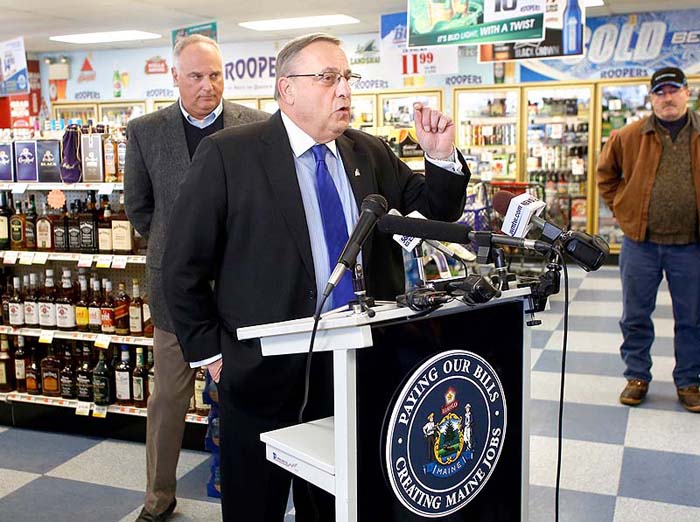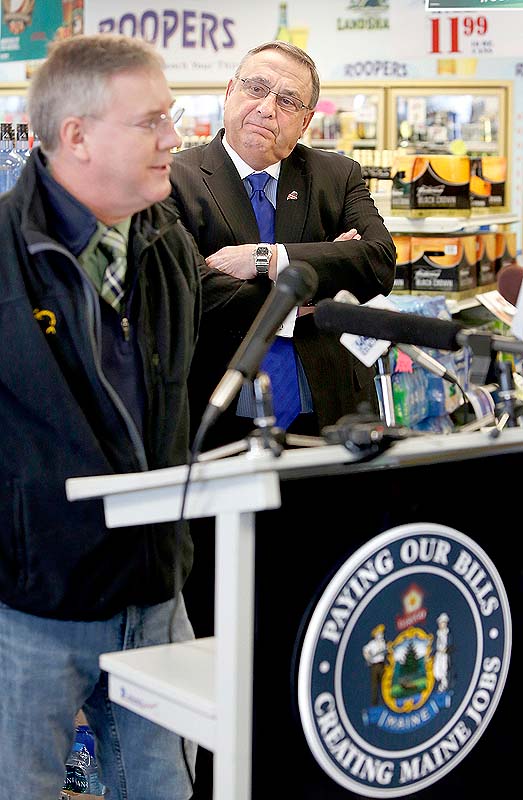AUBURN — Gov. Paul LePage said Friday that he will be happy to issue voter-approved bonds totaling $105 million, but only if lawmakers first pass his plan to repay $184 million in debt to Maine’s hospitals by borrowing against future liquor sales revenue.
“The pen’s right here,” LePage said at Roopers Beverage in Auburn, where bottles of liquor lined the shelves behind him as he spoke to the press. “In fact, if I could trust them, I’d do it on a promise.”
The comments marked the latest back-and-forth between LePage and Democratic lawmakers, who have not embraced his plan and earlier this week accused the governor of holding bonds hostage until he gets his way.
LePage wants the state to take back control of liquor sales when the current wholesale contract expires next year. He has proposed hiring a contractor to monitor inventory, manage accounts and advertising, and coordinate with suppliers. He says that would give the state a bigger share of liquor proceeds.
The state would borrow money to repay the hospitals, paying off the debt over time with liquor revenue.
The governor has threatened to veto every bill that comes to him until his bill passes. He didn’t back off Friday.
“I don’t like to go back on my word,” he said. “I’m not threatening anyone. I’m not in a tantrum. I’m not doing anything other than (saying), ‘Let’s pay our bills.'”
The state’s $184 million payment to the hospitals for Medicaid services would draw an additional $300 million in federal funds.
Democrats say they want to pay the hospitals, too, but they don’t agree with the governor on withholding the voter-approved bonds, which would fund transportation infrastructure improvements, land conservation, clean-water improvements and higher-education construction projects.
“The governor has arbitrarily and artificially linked the release of voter-approved bonds to his convoluted plan for the state’s wholesale liquor business and the final debt payment to our hospitals,” said Rep. Jeff McCabe of Skowhegan in the Democrats’ weekly radio address, released Friday.
A public hearing on LePage’s bill, L.D. 239, is scheduled Monday before the Veterans and Legal Affairs Committee. That discussion could bring the sides closer or widen the divide.
Sen. John Cleveland, D-Auburn, said Democrats have not dismissed the governor’s proposal but have real concerns about whether the state can legally pay off hospital debt with bonds.
Cleveland said a 2009 opinion by Attorney General Janet Mills suggests that the governor’s idea might be unconstitutional. However, that opinion applied to general obligation bonds, which are backed by taxpayers, not revenue bonds proposed by the governor, which are backed by investors.
“It speaks, I think, to both,” Cleveland said, based on a conversation with Mills this week.
LePage said he, too, has talked to Mills, a Democrat, about those concerns. “I think it’s all a matter of interpreting the state Constitution. If you’re an opponent of this bill, then you obviously don’t believe it’s appropriate or constitutional,” he said. “If you read the Constitution and you understand English, it’s very constitutional.”
In 2004, Maine leased its liquor distribution to a contractor, Maine Beverage Co., for 10 years. The state was paid $125 million up front, which helped it solve a budget crisis, and received an annual share of profits. LePage and others now say that share is much less than it should be.
Last year, the state’s share was about $8.5 million. Gerry Reid, the state’s director of alcoholic beverages and lottery operations, has estimated that Maine could collect as much as $45 million each year by renegotiating the contract.
In addition to borrowing against future liquor revenue to pay the hospitals now, LePage’s bill would lower the cost of some liquor in Maine to help the state be more competitive with New Hampshire. The governor said it also would help retailers “be a little more . . . profitable.”
LePage tried to shore up support for the bill Friday, first from Steve Roop, who owns Roopers Beverage and other liquor stores in the area, and later from Laird Covey, president of Central Maine Medical Center in Lewiston, which will be paid $51 million if the governor’s deal is approved.
“It’s very urgent for us,” Covey said after the governor finished an hour-long tour of the hospital. “It’s been an issue for 10 years.”
Covey called the governor’s proposal a “concrete plan” to pay down the debt immediately. He said he has not seen any other ideas.
Sen. Seth Goodall, D-Richmond, has sponsored a competing liquor bill that will be heard Monday. Like the governor’s proposal, it would allow private firms to bid on a 10-year contract.
Unlike LePage’s plan, it would require the winner to make an upfront payment and would not earmark revenue for specific uses.
While Democrats continue to criticize the governor for his tactics, LePage said, “I’ve tried everything with those guys. They simply don’t want to deal.”
Asked why he didn’t propose the bill when he had a more sympathetic legislature — he had Republican majorities in the House and Senate for his first two years as governor — LePage responded, “When did I have that?”
Staff Writer Eric Russell can be contacted at 791-6344 or at
erussell@pressherald.com
Twitter: @PPHEricRussell
Send questions/comments to the editors.







Comments are no longer available on this story